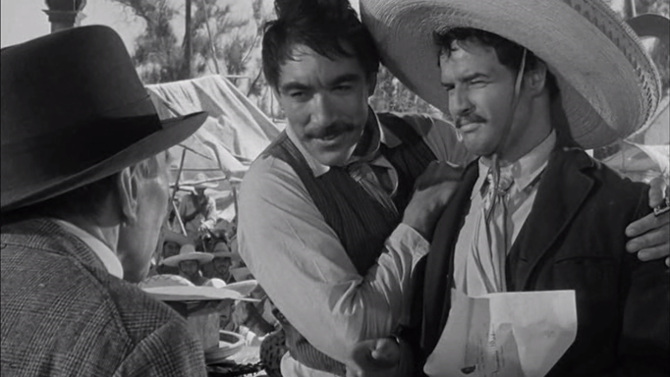There is a scene about a quarter of the way into Elia Kazan’s Viva Zapata! where our protagonist, Emiliano Zapata (Marlon Brando), has been arrested for attempting to save the life of a peasant who has been unlawfully arrested. Failing, a number of the impoverished, who witnessed the attempt, plead for Zapata to hide in one of their homes. Moving on, he is soon arrested, and the villagers clap with whatever they have in their reach; working tools, rocks or any other implements, as a way to show their support for the hero as he is ushered away. As the officers transport the man through the wilderness, people pour out of the mountainous forest – soon, droves are leading, following and walking beside the police procession. Eventually overwhelmed by the masses, they free the man, aware that they will never be able to manage the united crowd. It is this scene that perhaps best exemplifies the film. A heartfelt sequence, it shows that solidarity in the face of oppression, that boldly standing up for what is right, is a righteous, albeit difficult stance.
At the Cornwall and Area Pop Expo (CAPE), I was lucky enough to chat with icon Sally Kellerman. Working six decades in the business, she is perhaps best remembered as “Hot Lips” Houlihan in Robert Altman’s film M*A*S*H, in which she was nominated for an Oscar. Following the legendary role, she went on to appear in several other Altman pictures, including Brewster McCloud, Welcome to L.A. and The Player. Two other starring roles that always come to mind when discussing her filmography are: her turn in Last of the Red Hot Lovers, as well as playing opposite Rodney Dangerfield in the 1980’s comedy Back to School. She has also graced the television screen, including two memorable episodes of The Outer Limits (The Bellero Shield; The Human Factor) and one of Star Trek (Where No Man Has Gone Before). She is also a talented singer, though she only recorded one album back in 1972. Almost forty years later, she released Sally, a beautiful record that is definitely worth a listen.
When the conversation turned to her top film, she understandably found the question difficult. She did divulge that her favourite actor was the late, great Marlon Brando, and that Viva Zapata! stuck in her mind as being the first time she fell for his impressive talents. Thus, this movie will be reviewed here today. Make sure to watch the video below to hear some in-depth stories about her time on a number of sets, and a further description of why she is a fan of Brando and Viva Zapata!.
Zapata, a farmer from good stock (though his parents were wealthy, his family has lost all land and wealth), heads to the capital to visit President Porfirio Diaz (Fay Roope), as their land has been forcibly taken by a wealthy resident. A corrupt leader, he does nothing to help rectify the problem. Soon Zapata has rallied the farmers, uniting them to fight the injustice, along with his brother Eufemio (Anthony Quinn in an Oscar winning performance – the first Mexican-American to win the statue).
The rebel is soon tracked down by Fernando (Joseph Wiseman – the original Bond villain, Dr. No), an advisor of Francisco Madero (Harold Gordon) – a political dissident and reformer who is rallying the people of Mexico from his hideout in Texas. Looking for help from Zapata in the South, and Pancho Villa (Alan Reed – the voice of Fred Flintstone) in the North, he plans on overthrowing Diaz.
Though Zapata takes on the job as General, he is equally as interested in wooing Josefa (Jean Peters), a strong-willed woman from a wealthy family. Though she puts up walls to hide her true passion, she too has feelings for the virile man.
It does not take too long for Diaz to flee his long held post, though it is soon visible that Madero, a good-hearted but weak-willed individual, is not going to be able to make the changes that he has promised (partially because the same advisers surround him – including the forceful General Victoriano Huerta (Frank Silvera)). It is a case of the new boss being the same as the old boss. Soon, things are dissolving once again. Will Zapata be able to stabilize things once and for all, bringing peace and unity to a land that is divided, or will he fail to resolve the problems, falling along the way?
Written by famed author John Steinbeck, he infuses his work with a study of the corruption of power. Despite the best of intentions, such things as appeasement, justifications, weakness, seduction, fear and many other factors play into the failure of individuals to truly make changes when entering the most complex of arenas. It also has a major political undercurrent that speaks to both the Cold War era in which it was made, as well as having many correlations to things occurring in the world today.
The script also contains some wonderful one liners. After a major victory, Eufemio and Fernando discuss politics while enjoying a drink. Gloomily, Fernando utters that they have only won “half victories. All this celebrating, nothing really won”. Eufemio laughingly responds, “I love you, but I do not like you. I never liked you, my friend”. In another wonderful exchange, Zapata sits with Josefa and her two female chaperones, trying to make conversation. Zapata, having been at war for some time, asks, “Did you think of me?”. Formally, the lady replies, “it is said a warrior’s shield is his sweetheart’s heart”. The more literal man confusedly says, “Huh?”. Trying once again, she poetically claims, “we have a proverb: a man well dressed is a man well thought of”. This time prepared, Zapata responds, “A monkey in a silk, is still a monkey. . .”.
As the story goes, Quinn was rather disappointed by the casting of Brando – seeing his own Latin background as being perfect for the role of Zapata. Supposedly, to resolve the situation, the two macho men made a wager over who would be able to urinate farther across the Rio Grande. Brando won. . . in what was perhaps the first pissing contest.
Though at first a bit odd (watching Brando and others portraying Mexicans), you become accustomed to the performances, and truly begin to embrace Viva Zapata! as a superb film. Kazan and producer Darryl F. Zanuck attempted to get the picture as authentic as possible, delving deeply into the photography taken at the time of the historic happenings. The story has a mythical spirit, with Zapata built up as a folkloric figure, somewhat like Zorro – a hero who will arrive when things look most grim, yet his heart can be found deep within every hardworking individual. No fooling, Viva Zapata! is a wonderful motion picture that shoots to thrill.


